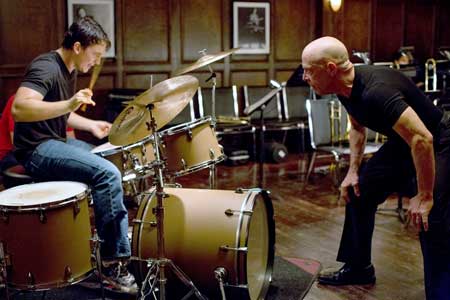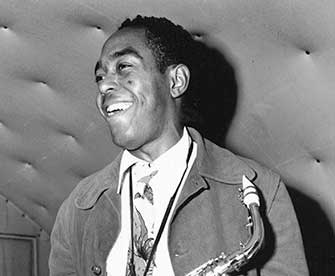Film (2014)
Written and directed by Damien Chazelle
Music by Justin Hurwitz; Cinematography by Sharone Meir; Film Editing by Tom Cross
With Miles Teller (Andrew), J.K. Simmons (Fletcher), Paul Reiser (Jim), Melissa Benoist (Nicole)

J.K. Simmons as Fletcher
in “Whiplash”
Photo by Daniel McFadden
Courtesy of Sony Pictures Classics
Terence Fletcher (J.K. Simmons) is a noted and notorious jazz teacher at Schaeffer Conservatory of Music, prone to berate and belittle his students. Apparently his most promising students get it the hardest, and Andrew Neiman (Miles Teller) is no exception. Riveted on becoming the best of the best, Andrew takes it on the chin from Fletcher, who continues to dole it out, until the seams on both sides begin to break, with difficult, and extraordinary, consequences.
What a weirdly intense teacher Fletcher is. He claims that Jo Jones, drummer for Count Basie got Charlie Parker to become “Bird,” to play so proficiently and wildly that he entered a class all his own, and that his own mission as teacher is to try to draw that out of his students. According to Fletcher, Jones, in the effort to get Parker to put out exceptional effort, threw a cymbal at his head, risking, but missing causing, severe injury. (Actually, the story is that Jones threw a cymbal at Parker’s feet when the young Parker, at 16, got out of rhythm while playing with the Basie band. Apparently, the real case was much less threatening than the case as reported by Fletcher in Whiplash.)
Fletcher, himself, is unbelievably caustic. The amount of insult and invective that makes up the bulk of his dialogue is oppressive. It’s unrestrained and undermining to its recipients and one is left to judge whether it is helpful or not.
With a call back to a film like An Officer And A Gentleman (1982) with Louis Gossett, Jr. as the dictatorial sergeant who bangs Richard Gere’s character Mayo into shape, one appreciates what might be the benevolent intent and outcome of this seemingly sadistic approach.
But that was the military and this is a music school. After hurling his invectives, Fletcher oddly tells his students to “have fun,” which sits like a gnawing paradox throughout this insult fest.

Michael Ochs Archives
When Fletcher thinks someone in an ensemble is playing out of tune, he shouts at one kid: Tell me it’s not you, Elmer Fudd – Metz, why are you still sitting here? Get the fuck out!
Calling them limp dick dispshits, hurling endless homophobic insults like you pathetic pansy ass, fruit fuck, or naming one of them leprechaun, Fletcher commands by intimidation that hovers right on the line of sadism.
No two words are more harmful that good job, says Fletcher when he tells Andrew that he could have just patted him on the head and not challenged him. I’m there to push people beyond what’s expected of them, he says.
The film brings the student-teacher relationship between Andrew and Fletcher into sharp focus and carries it across a couple of borders before it finds its home. Calling Fletcher’s methods into question, it doesn’t simply glorify them, but it also leaves open to question the whole issue of the efficacy of that approach. If the film has a failing, it is exactly that squeamishness about judging these sorts of pedagogical methods. Discipline, indeed, is most desirable, but brutality is not, and the film is not quite willing to make that point.
Nonetheless, this is a great jazz film, and shows something of the incredible artistry required to master the form. It hints at, but does not quite focus on, the endangered state of that art and its sidelining in the contemporary world, its practitioners frequently economically challenged. The field is highly restricted by the necessities of talent, but also by the absolute scarcity of market opportunities.

in “Whiplash”
Photo by Daniel McFadden
Courtesy of Sony Pictures Classics
A fragile romance between Andrew and Nicole (Melissa Benoist) highlights the challenges posed by his being Fletcher’s student. Support from Andrew’s benevolent and caring Dad (Paul Reiser), fills around the edges when it all gets to be too much.
Some interesting quick action montage provides visual interest in the midst of a running and stimulating soundtrack, largely made up of some standards, Whiplash and Caravan, filled out by the compelling compositions and arrangements of Justin Hurwitz.
The script is forceful, but there is enough ambiguity in its overtones to leave unfortunate room for believing that mastery and catharsis require pedagogic violence.
Nonetheless, J.K. Simmons gives a masterful performance as the professorial tyrant. Miles Teller does a creditable job as the embattled protege.
– BADMan
Leave a Reply